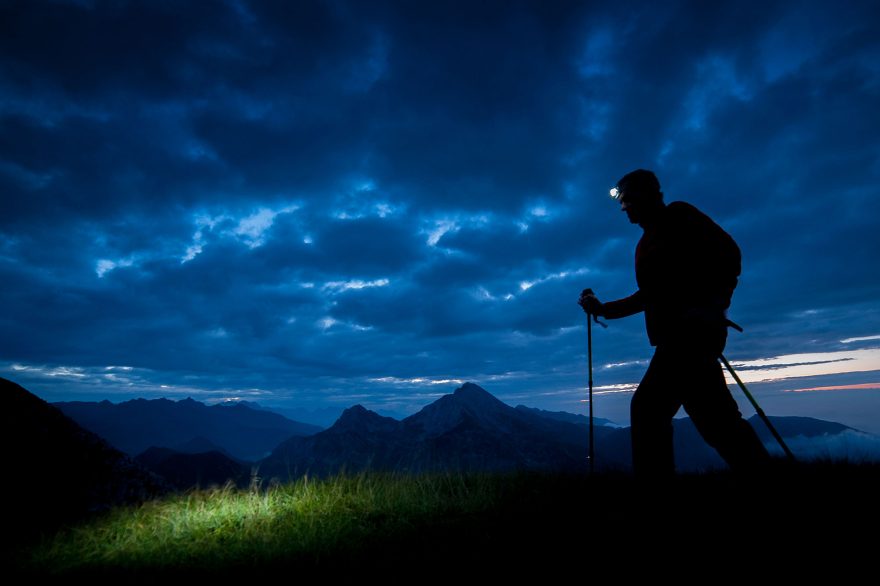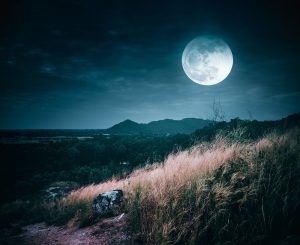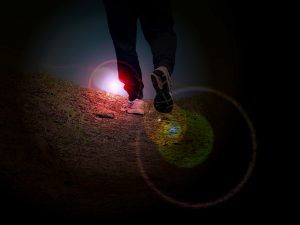
Image by Pierluigi.Palazzi, Shutterstock
Maybe your work schedule doesn’t allow you to get to the trailhead during daylight hours. Perhaps you live somewhere that gets extremely hot (we’re looking at you, Arizona), but it’s still important to get those miles in. Or, maybe you simply enjoy the distinct quiet and liberating feeling that comes with having the trail all to yourself. If any of these sound like you, night hiking is the perfect solution.
Night hiking is an incredible, unique experience that’s both challenging and rewarding — much like traditional hiking. Some senses are heightened (like your hearing), while others are decreased (your vision). You also have the opportunity to stargaze as you hike, and a significantly better chance of spotting wildlife.
Needless to say, whether you’re an avid hiker or just starting to get into it, night hiking can completely elevate your hiking game. However, there are some things you should know before setting out on the trail after dark.

Image by kdshutterman, Shutterstock
Night Hiking Safety Tips
No matter how experienced of a hiker you are, night hiking is a whole different animal. These tips for hiking at night will not only keep you safe, but also make the experience more enjoyable.
1. Do your hike in daylight at least once before attempting it at night. Ideally, you should actually do this a couple of times. It’s very, very easy to become disoriented outdoors at night, even in a familiar area. You may not be able to identify landmarks along the trail that you normally can in daylight, or — possibly worse — they may look completely different at night. There’s also the fact that our eyes tend to “play tricks” on us in the dark. Play it safe and don’t attempt a night hiking trail without first familiarizing yourself with it during the day.
2. Start small. Your first several night hikes should be trails that are short and sweet, regardless of your hiking experience and skill levels. Wayfinding in the dark and even just being outdoors at night is a huge adjustment, never mind attempting technical scrambles or having to worry about avoiding sheer cliff edges you can’t see. Start small to build up your familiarity, confidence, and experience levels with night hiking.
Along the same lines, allow yourself extra time when hiking at night. Even under the best circumstances, it goes at a much slower pace than during the day. This is another reason to “scout” your night hiking trails ahead of time and opt for shorter ones.
3. Stay close to home. For many of the reasons we just mentioned, it’s probably a good idea not to venture too far from home when you’re night hiking. The chances of something going wrong are automatically increased based solely on the fact that it’s nighttime. Don’t chance it.
4. Consider starting at dusk. If possible, watch the sunset and then hit the trail immediately afterwards. Your eyes transition to the dark more gently and naturally this way, plus there’s the bonus of being able to watch the sunset and do some stargazing on the same hike.

Image by Kyle Anthony Photography, Shutterstock
5. Choose an open, less forested trail. Even (and perhaps especially) if your go-to trails are in the woods, a more open trail is better for night hiking in numerous ways. You’ll feel safer being able to see a further distance all around you, you’re less likely to be surprised by any sort of wildlife, and you’ll have much better stargazing opportunities on an open trail. Thick trees also block much of the helpful light from the moon and stars, whereas if you’re night hiking out in the open, your path will be naturally illuminated.
6. Bring plenty of water. Hiking at night may feel easier because the sun isn’t beating down on you (and in all fairness, in many ways it is). However, your body is still working extremely hard and you can become dehydrated even at night. We recommend finding a hydration pack or vest you love and always bringing more water than you think you’ll need. As a general rule of thumb, you should drink one cup of water for every hour of physical activity you’re participating in.
7. Dress in layers. Even during the summer months, nighttime temperatures often drop substantially once the sun fully sets — especially in the mountains and desert. You may also sweat (because remember, even if night hiking feels easy, your body is still working hard!), which can leave you damp and cause issues with regulating your body temperature. Dress in layers, such as a vest over your shirt or wearing a light pullover, to stay comfortable. It may also be a good idea to keep a windbreaker or ultralight jacket in your pack, just in case.
8. Wear light, bright colors and clothing with reflective details. This tip for hiking at night ensures that you have some added visibility. The last thing you want is to surprise (or be surprised by!) other hikers, vehicles, or wildlife!
9. Pay attention to the weather forecast. In some areas (like, yes, the desert and mountains), evening showers that seemingly come out of nowhere are not at all uncommon. Trust us, it isn’t fun to be unexpectedly caught in a storm while you’re hiking at night, so pay careful attention and dress appropriately. This is another great reason to carry an extra jacket in your pack, too!
10. Watch the moon cycle. When possible, try to time your night hikes for when the moon is full or nearly full so you have natural light to guide you. Moonless nights are excellent for stargazing but not the most ideal for night hiking.

Image by candy candy, Shutterstock
Gear You Should Have for Night Hiking
Starting out with the right gear is a crucial step to ensuring your night hiking experience goes smoothly. You’ll enjoy yourself so much more if you’re comfortable and safe.
- Headlamp: There are a ton of fantastic options for headlamps today. Look for one that not only fits you comfortably, but also has multiple brightness settings and a red light feature. Red light doesn’t interfere with your vision nearly as much as harsh white light, so this is a must-have feature for night hiking in particular. You may also want to look for a rechargeable headlamp, especially if you’re planning to hike at night frequently.
- Flashlight: It’s a good idea to keep a flashlight in your pack as an emergency backup. You just never know what you may come across while night hiking, and a backup flashlight could come in handy in almost any scenario. Your headlamp batteries could die, the headlamp could get broken somehow, or you may encounter another hiker in need of help.
- Batteries: Having a few extra batteries on hand is also smart for night hiking. Think about all the devices you have that use batteries — your headlamp, flashlight, and even phone — and keep one set of extras for each.
- Sturdy shoes: This one may seem obvious, but it’s so important that it needs to be stated anyhow. Even if you’re a highly experienced trail runner or a veteran hiker, night hiking is not the setting for hiking sandals or lightweight shoes. Wear rugged, supportive hiking shoes for night hikes. You’ll appreciate the extra support when you accidentally step into an unknown animal’s hole or a puddle of who knows what — which, let’s be honest, is inevitable.
- GPS: The last thing you want to be doing as you hike at night is looking down and messing around with your phone. So while a GPS-enabled app downloaded on your phone works fine (think AllTrails or Gaia GPS), you’re better off with a standalone GPS device or GPS watch for night hiking.
Taryn Shorr is an avid outdoor enthusiast, frequent traveler, and wannabe photographer based in southern Arizona. She lives for the opportunity to explore The Great Outdoors, both at home and in new destinations, and firmly believes that nature is a form of both therapy and religion.
 Your Privacy Choices
Your Privacy Choices